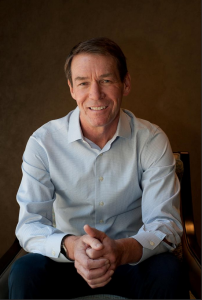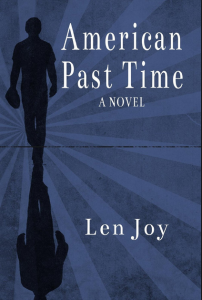Len Joy’s first novel American Past Time was released April 19, 2014, with Hark! New Era Publishing. He is the author of two short fiction collections, Casualties and Survivors. His work has appeared in FWRICTION: Review, The Journal of Compressed Creative Arts, Johnny America, Specter Magazine, Washington Pastime, Hobart, Annalemma and Pindeldyboz. He is a competitive age-group triathlete. In June 2012 he completed his first (and probably only) Ironman at Coeur d’Alene, Idaho.
Bonnie ZoBell: I’ve heard it said before by other female readers, but I’ll say it again—even though I’m not very interested in baseball, I thoroughly enjoyed American Past Time. Why do you think that is? I know one thing for me is that Dancer’s life is very different from my own, and I enjoy that in a book, understanding in an in-depth way what a whole different lifestyle would be like.
 Len Joy: First of all, I wanted to thank you, Bonnie, for including me in your interview series. It’s great to talk to you again.
Len Joy: First of all, I wanted to thank you, Bonnie, for including me in your interview series. It’s great to talk to you again.
From the feedback and reviews I’ve had so far, I think American Past Time appeals as much to women as to men and to both younger readers (meaning under 40) and the not so young.
I am tempted to say that American Past Time is not really a baseball story, but I don’t want to run from the baseball aspect – it is an important element of the book. The main character, Dancer, is a baseball player who has a dream of becoming a major league ballplayer, but falls short of realizing that ambition. The story is about the life that happens after the cheering stops.
I agree with you about what makes fiction appealing. I think it’s that opportunity to be delivered to a world we don’t necessarily know much or anything about. I just read a novella by Anne Elliott, “The Beginning of the End of the Beginning,” which is about a performance artist who has to take a job as an office temp to support himself. Performance art is not something I have much knowledge or interest in, but I instantly identified with her main character and his struggle to find his way. And along the way I learned something about performance art. I think good fiction is the most painless way to discover worlds we might otherwise avoid.
BZ: Dancer’s sole dream in life, after his father took him to a Cardinals game as a child, is to play professional baseball. Even when his wife is pregnant with their second child, he doesn’t take a full-time job that would have paid better and made a more stable life. He continues to play for the minor leagues and wait for his one big chance with the bigs. What do you think this says about him?
LJ: The book is in many ways about the choices we make or don’t make. Dancer chose to stay in a game when perhaps if he had been more cautious, he would have come out of it and avoided the injury that ultimately cost him his big chance.
I have had discussions with groups who have read the book,  and some people feel strongly that Dancer was foolish to stay in the game. They see his actions as hubris. Maybe. But perhaps not surprisingly, I know if I had been in Dancer’s position, I would have made the same choice he did. He pursued perfection in that moment and he succeeded. He never regrets that decision. That perfect game is the one thing that, despite all of the problems he encounters in his life, can never be taken from him.
and some people feel strongly that Dancer was foolish to stay in the game. They see his actions as hubris. Maybe. But perhaps not surprisingly, I know if I had been in Dancer’s position, I would have made the same choice he did. He pursued perfection in that moment and he succeeded. He never regrets that decision. That perfect game is the one thing that, despite all of the problems he encounters in his life, can never be taken from him.
He does finally give up his dream for the sake of his family. If he had been unmarried without children he would have continued to play baseball forever if he could. It was something he loved that he gave up for his family. He tried to do the right thing, but he had a lot of trouble adjusting. His struggle and how it impacted all the members of his family is what the novel is about.
BZ: One of the things I like best in the book is how well you depict the anger Clayton has for his father, Dancer. You do a great job of showing that in various scenes with a lot of depth, and this anger, sometimes bordering on hatred, goes on for years. We’re raised to believe it’s not right to have such horrible feelings for our parents, yet I found it hard not to be sympathetic toward Clayton, who is just a boy when this starts and maybe isn’t mature enough to understand everything going on with the adults. Did you know they were going to have this relationship when you started the book, or did it evolve as you wrote it?
LJ: The book actually began as a short story that takes place when Clayton is an adult and is estranged from his father. As I started to explore that rift, I wrote more and more backstory about Dancer and his problems. How he got to be the way he was became the focus of the novel.
The downward spiral in Dancer’s relationship with his son Clayton and with his wife Dede was difficult to write as I couldn’t really draw on my own life experiences. I had a great relationship with my father and I have good relationships with my son and daughters and wife.
I believe one of the most awful things to endure as a parent would be to lose the respect of one of your children. Clayton’s feelings are intensified because he had his father on a pedestal – he really believed he was “perfect.” So when Dancer reveals himself to be all too human, that magnifies Clayton’s feelings of anger and betrayal.
BZ: And Dancer’s other son, Jimmy, is hysterical. He’s not big and manly like his brother and father, or good at sports. In fact, he’s a bit pudgy. But he’s got a businessman’s knowledge from an amazingly young age and comes up with all kinds of schemes—that work!—to make money by providing services we all take for granted. He even helps his father and brother figure out how to make more money at their jobs. Do you think he eventually feels less left out about not being like his father and brother and appreciates what he has to bring to the table?
LJ: The Stonemason family has more than their share of problems. Dancer, Dede and Clayton all have significant life challenges. Jimmy is an island of stability and goodness in a very rough sea.
He’s one of those kids who you just shake your head and wonder how he got to be the way he did. He’s not athletic like his father or brother. He struggles with his weight, and that bothers him, but it doesn’t own him. He doesn’t channel that into resentment of his older, cooler brother. In fact he is always there for his brother, and in the end it is Jimmy who is pivotal in the redemption of the family.
BZ: That’s another thing I really like in the book, your sense of humor. You do an excellent job of depicting a regular family with all the usual ups and downs, but one of the ways you show their love and fondness for each other is through the funny, homely things they say when they interact. That’s a fine line to walk in a book that has a lot to do with family—not getting too schmaltzy but still being able to show their feelings. Did you have to work at the humor that solves a lot of issues in the book, or did it come easily?
LJ: No, it came easily, I’m a funny guy.
Okay maybe I can amplify. I grew up with three sisters and we always had family dinner together. Girls are funny. I lived in a small town and played three sports all through high school. High school jocks can be really amusing. When I grew up and got a real job it was in a factory / small business environment. Factory hands, salesmen, helpful government agencies like the IRS and INS – I was literally surrounded by humorous folks.
And to add to all that I’ve been married for forty plus years and my wife is a lawyer. Everyone knows how funny lawyers are.
So between the sisters and the jocks and the factory hands and the salesmen and the wife and the kids I have lots and lots of material to draw on.
BZ: I know you’re a triathlete. Have you ever played a sport you wanted to become a professional at so badly it hurt, like Dancer?
LJ: No. But when I went off to college I had two secret goals. One was to be a professional football player (I saw myself as the next Fred Biletnikof) and the other was to be a writer. It didn’t take too many college football games for me to abandon my football goal and only one excoriating critique from my early American literature professor to extinguish my dream that I would someday write the great American novel. And while the football dream was never resuscitated, a few years later I did start writing again. It was good for me to do something else before I started writing. I needed the experiences and I needed to toughen up.
That English professor taught me two valuable lessons. First was that I shouldn’t take criticism so seriously. A review or a grade is just one person’s opinion. The second lesson was to be considerate of other people’s feelings when I critique or review something. That’s the more important lesson, I think.
BZ: What are you working on now?
LJ: I am about twenty-five percent through with the sequel to American Past Time. This novel is titled American Jukebox and it takes place on a single day thirty years after the end of American Past Time.
Looks like we’re out of time. Thanks again, Bonnie, for giving me a chance to talk about American Past Time.


Leave A Comment